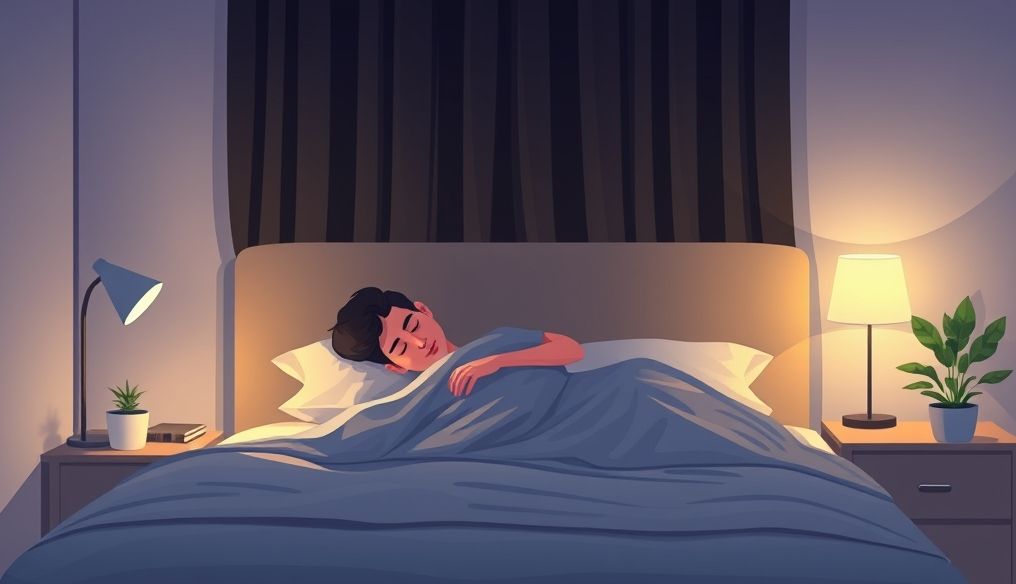What is Good Sleep and Why is it Necessary?
Good sleep is more than just the number of hours you sleep; it's about the quality of sleep. Deep sleep allows the body and mind to rest and regenerate, which significantly affects your physical and mental health. Lack of sleep or interrupted sleep can lead to serious health problems such as weakened immunity, weight gain, cardiovascular problems, depression, and anxiety.
Benefits of Good Sleep:
- Improved Memory and Concentration: Sleep enhances the brain's ability to process and store information.
- Strengthened Immune System: Adequate sleep helps the body fight diseases and infections.
- Improved Mood: Good sleep reduces stress, anxiety, and depression.
- Increased Productivity: Sufficient sleep makes you more active and focused during the day.
- Maintaining a Healthy Weight: Lack of sleep affects the hormones that regulate appetite, which can lead to weight gain.
Creating the Ideal Sleep Environment
Your bedroom is your sanctuary. Make it a quiet, comfortable, dark, and cool place. These factors play a crucial role in improving your sleep quality.
Tips for Creating an Ideal Sleep Environment:
- Complete Darkness: Use blackout curtains or an eye mask to block out light.
- Quiet: Use earplugs or a white noise machine to block out external noise.
- Appropriate Temperature: Keep the room temperature between 18-20 degrees Celsius (64-68 degrees Fahrenheit).
- Comfortable Mattress and Pillows: Invest in a mattress and pillows that support your body properly.
- Avoid Electronic Devices: Stay away from phones, tablets, and TVs at least an hour before bed.
Establishing a Consistent Sleep Routine
Your body loves routine. Going to bed and waking up at the same time every day, even on weekends, helps regulate your body's biological clock.
Steps to Establish a Consistent Sleep Routine:
- Set a Bedtime and Wake-up Time: Choose a time that works for you and stick to it as much as possible.
- Relax Before Bed: Engage in calming activities such as reading, listening to soothing music, or taking a warm bath.
- Avoid Caffeine and Alcohol Before Bed: Caffeine and alcohol can affect the quality of your sleep.
- Exercise Regularly: Exercise helps improve sleep, but avoid exercising right before bed.
- Avoid Long Naps: If you need a nap, keep it short (20-30 minutes) and avoid taking it late in the day.
Nutrition and Sleep: What to Eat and When?
What you eat and when you eat it can significantly affect your sleep. Some foods and drinks promote sleep, while others hinder it.
Foods and Drinks That Promote Sleep:
- Foods Rich in Melatonin: Cherries, kiwis, bananas.
- Foods Rich in Tryptophan: Turkey, warm milk, nuts.
- Foods Rich in Magnesium: Dark leafy greens, nuts, seeds.
- Herbal Teas: Chamomile, lavender, peppermint.
Foods and Drinks to Avoid Before Bed:
- Caffeine: Coffee, tea, soda, chocolate.
- Alcohol: It may make you feel sleepy initially, but it hinders deep sleep.
- Fatty and Heavy Foods: Can cause indigestion and affect sleep.
- Sugary Foods: Can cause a spike in blood sugar, leading to insomnia.
Relaxation and Meditation Techniques
Stress and anxiety are major causes of insomnia. Relaxation and meditation techniques can help you calm your mind and body before bed.
Relaxation Techniques:
- Deep Breathing: Take deep, slow breaths, focusing on inhaling and exhaling.
- Progressive Muscle Relaxation: Tense and relax different muscle groups in your body.
- Meditation: Focus on your breath, a calming image, or a repeated word.
- Yoga: Practicing yoga helps calm the mind and body.
- Guided Imagery: Imagine a quiet and relaxing place.
When Should You Seek Medical Help?
If you experience chronic insomnia or other sleep problems that affect your daily life, it is important to seek medical help. There may be underlying medical reasons contributing to your sleep problems.
Signs You Need Medical Help:
- Persistent Insomnia: If you have been experiencing insomnia for more than three months.
- Excessive Daytime Sleepiness: If you feel extremely sleepy during the day despite getting enough sleep.
- Loud Snoring or Sleep Apnea: These symptoms may indicate sleep apnea, a serious condition that requires treatment.
- Restless Legs Syndrome: If you feel an irresistible urge to move your legs, especially at night.
Technology and Sleep: How Can Smart Devices Help You?
There are many smart devices and apps that can help you track and improve your sleep. These tools can provide you with valuable insights into your sleep patterns and help you identify factors that affect its quality.
Examples of Smart Devices and Apps:
- Sleep Trackers: Such as Fitbit and Apple Watch, which monitor your sleep patterns and record sleep duration and quality.
- White Noise Apps: That emit soothing sounds to help block out external noise and promote relaxation.
- Meditation Apps: Such as Headspace and Calm, which offer guided meditation sessions to help calm the mind before bed.
- Smart Lights: That can be programmed to mimic sunrise and sunset, helping to regulate the biological clock.
Sleep and Mental Health: A Close Relationship
Mental health and sleep are closely linked. Sleep problems can lead to mental health issues, and vice versa. Addressing mental health problems can improve sleep quality, and vice versa.
Tips for Improving Sleep and Mental Health:
- Exercise Regularly: Exercise helps reduce stress and anxiety, improve mood, and enhance sleep.
- Spend Time in Nature: Exposure to nature helps reduce stress, improve mood, and enhance sleep.
- Practice Relaxation Techniques: Relaxation techniques such as deep breathing and meditation help calm the mind and body and improve sleep.
- Get Social Support: Talking to friends and family or joining a support group can help reduce stress and anxiety, improve mood, and enhance sleep.
- Seek Professional Help: If you are experiencing mental health problems, it is important to seek professional help from a therapist or psychiatrist.
Conclusion: Practical Steps for Better Sleep
Good sleep is not a luxury, but a necessity for good health and a productive life. By following the tips and techniques mentioned in this article, you can improve your sleep quality, eliminate insomnia, and enjoy a healthier and happier life.
Summary of Key Tips:
- Create an ideal sleep environment.
- Establish a consistent sleep routine.
- Follow a healthy diet.
- Practice relaxation techniques.
- Seek medical help when needed.




